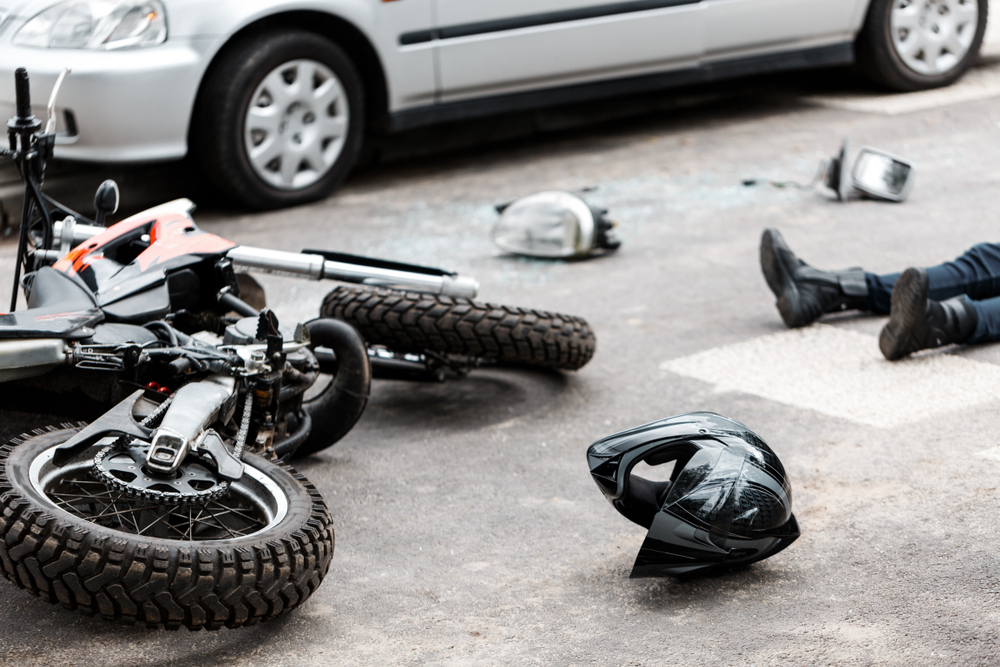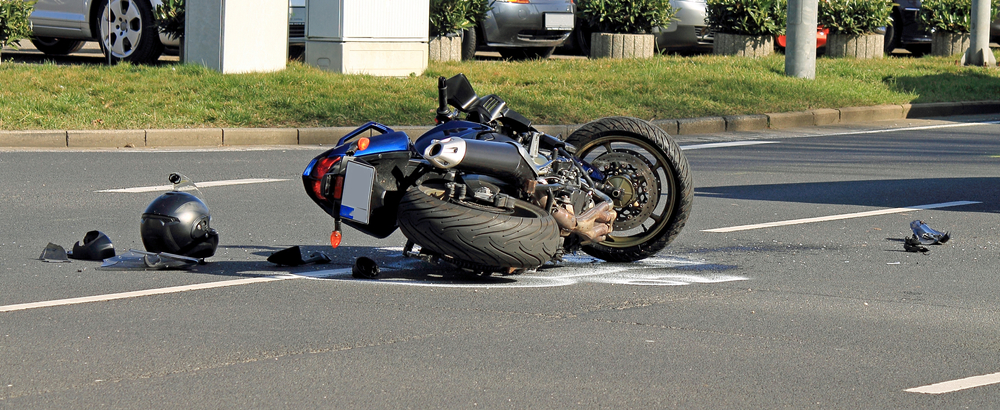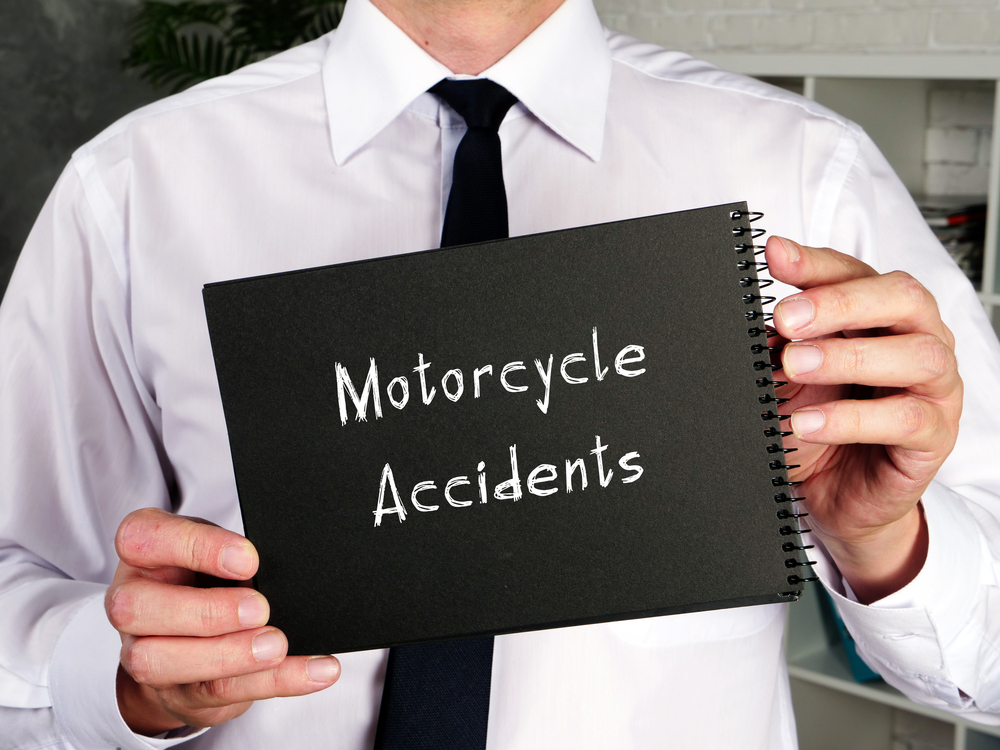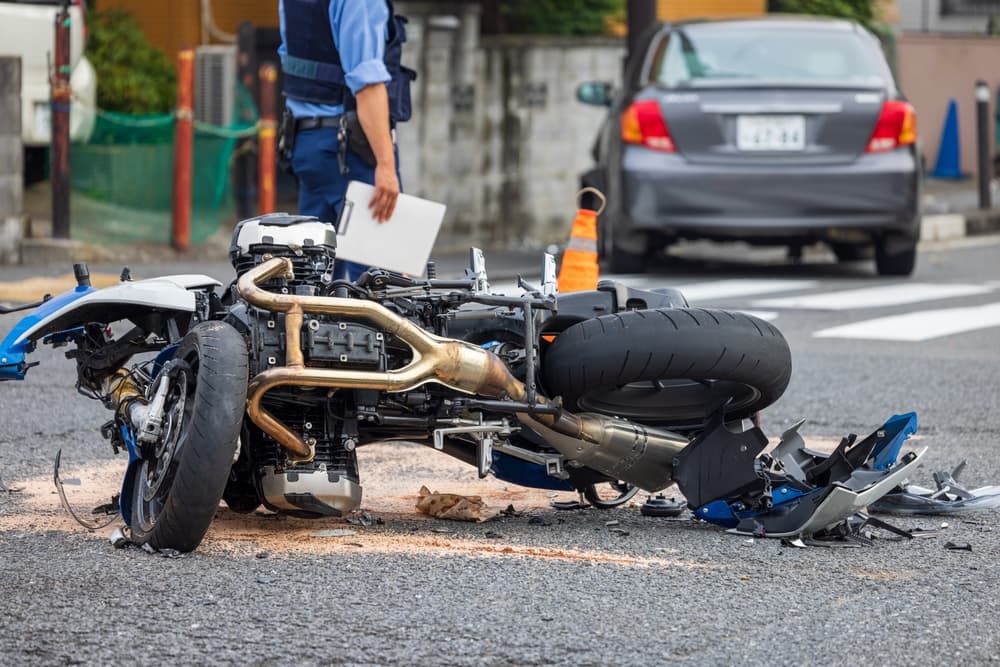Motorcycle accidents typically happen when other drivers violate traffic laws and drive in a careless and reckless manner. If you suffered injuries in a motorcycle crash that a negligent driver caused, you need experienced legal counsel in your corner as soon as possible. A skilled motorcycle accident lawyer can investigate the accident circumstances for you, gather documentation, file a personal injury claim, and negotiate with insurance company adjusters on your behalf. If the insurance company refuses to settle your case favorably, your lawyer can file a lawsuit and pursue a favorable resolution for you in court.
Injuries in Motorcycle Collisions

Motorcycle crashes often result in severe injuries due to the lack of protective barriers between the rider and the road or other vehicles. The most common physical injuries include head trauma, fractures, road rash, and spinal injuries.
Head injuries are the most serious and can range from concussions to traumatic brain injuries (TBIs). Wearing a helmet significantly reduces the risk, but even then, impacts can cause substantial harm. Symptoms of a TBI can include headaches, dizziness, confusion, and loss of consciousness. Treatment often involves immediate medical attention, imaging tests like CT scans, and, in severe cases, surgery.
Fractures are also frequent, particularly in the arms, legs, and collarbones. The force of a crash can easily break bones, leading to intense pain, swelling, and immobility. Treatment typically includes immobilization with casts or braces and, in severe cases, surgical intervention with metal rods or plates to hold the bones together.
Road rash occurs when a rider slides across the pavement, causing layers of skin to scrape off. This can range from mild to severe abrasions and is highly susceptible to infections. Proper cleaning, dressing of the wounds, and sometimes skin grafts are necessary for treatment.
Spinal injuries can result from the sudden impact of a crash, potentially leading to paralysis if the spinal cord is damaged. Symptoms may include numbness, loss of movement, and severe back pain. Treatment requires immediate stabilization of the spine, imaging tests, and potentially surgery to prevent further damage.
In addition to physical injuries, motorcycle crashes can cause significant mental trauma. Post-traumatic stress disorder (PTSD) is common among survivors, with symptoms such as flashbacks, severe anxiety, and nightmares. Depression and anxiety disorders can also develop, particularly if the injuries lead to long-term disability. Mental health treatment involves therapy, such as cognitive-behavioral therapy (CBT), and sometimes medication to manage symptoms.
Common Types and Causes of Motorcycle Crashes

The negligence of other drivers often causes motorcycle crashes. Common types and causes include left-turn collisions, rear-end collisions, lane changes, and dooring incidents.
- One of the most frequent and dangerous types of motorcycle crashes is the left-turn collision. This occurs when a car making a left turn at an intersection fails to see an oncoming motorcycle or misjudges its speed. The motorcycle, traveling straight through the intersection, has little time to react, resulting in a serious crash. Drivers often claim they did not see the motorcycle, highlighting a lack of awareness and attention.
- Rear-end collisions are another common type of motorcycle crash that negligent drivers cause. These occur when a vehicle following a motorcycle fails to stop in time, hitting the motorcycle from behind. Motorcycles can stop more quickly than cars and distracted or inattentive drivers may not notice a motorcycle slowing or stopping until it is too late. These crashes can throw the rider off the bike, leading to severe injuries.
- Unsafe lane changes can also contribute to motorcycle crashes. When drivers fail to check their blind spots or fail to signal before changing lanes, they may inadvertently move into the path of a motorcycle. Because motorcycles are smaller and less visible than cars, drivers frequently overlook them. This negligence can force the motorcyclist to swerve abruptly, potentially causing a crash.
- Dooring incidents occur when a parked car’s driver opens their door into the path of an oncoming motorcycle. This can happen in urban areas where motorcycles often travel close to parked cars. The sudden obstruction can cause the motorcyclist to crash into the door or swerve into traffic, leading to potentially life-threatening injuries.
- Negligent driving behaviors, such as speeding, distracted driving, and driving under the influence, further increase the risks for motorcyclists. Speeding drivers may not have enough time to react to motorcycles on the road, while distracted drivers, engrossed in their phones or other activities, may fail to notice motorcycles altogether. Drivers under the influence of alcohol or drugs have impaired judgment and reaction times, making them particularly dangerous to motorcyclists.
How to Prove Fault in a Motorcycle Accident Case
Proving fault in a motorcycle accident case involves gathering evidence to show that another party’s negligence caused the crash. This process requires careful documentation, witness statements, and sometimes expert testimony.
- First, gathering evidence from the accident scene is crucial: Photographs of the scene, including the positions of the vehicles, skid marks, road conditions, and any traffic signs, provide valuable information. These photos can help reconstruct the accident and demonstrate how it occurred. It is also important to get pictures of any visible injuries and damages to the motorcycle.
- Next, obtaining witness statements is important: Witnesses can provide an unbiased account of what happened. Their observations may confirm that the other driver was speeding, ran a red light, or was distracted. Getting their contact information at the scene is essential because their testimonies can be crucial later in court.
- Police reports are another critical piece of evidence: When law enforcement officers respond to an accident, they document the scene, interview involved parties and witnesses, and sometimes make determinations about fault. The police report often includes diagrams of the crash, descriptions of injuries, and statements about any traffic violations. This report can be a powerful tool in demonstrating fault.
- Medical records also play a significant role: They provide documentation of the injuries sustained in the accident, the treatment received, and the potential long-term effects. This information helps establish the severity of the accident and its direct link to the injuries.
- In some cases, expert testimony may be necessary: Accident reconstruction experts can analyze the evidence and recreate the sequence of events leading to the crash. They use physics and engineering principles to explain how the accident happened and who is likely at fault. Similarly, medical experts can testify about the extent of injuries and their likely cause.
- Eyewitness accounts from the motorcyclist and the other driver are also crucial: Consistent, detailed accounts from the motorcyclist can reinforce the claim. It is important for the motorcyclist to remember and note every detail about the accident, including any actions by the other driver that seemed negligent or reckless.
- Finally, traffic laws and regulations can help establish fault: If the other driver violated any traffic laws, such as running a red light or failing to yield, this can strongly support the case. Evidence of these violations can be obtained through witness statements, video footage from nearby cameras, or even the police report.
By methodically gathering and presenting this evidence, an injured motorcyclist can build a strong personal injury case.
Compensation in a Motorcycle Accident Case
If you are involved in a motorcycle accident and another party is at fault, you may be entitled to compensation to cover various losses. Some common losses of injured victims include the following:
- Medical Expenses — A substantial part of compensation will cover medical expenses. This includes all the costs related to your medical treatment after the accident. It covers hospital bills, surgery costs, medication, physical therapy, and any future medical care you may need because of your injuries.
- Lost Earnings — If your injuries cause you to miss work, you can be compensated for lost income. This means you can get money for the time you were unable to work due to the accident. If your injuries affect your ability to work in the future or force you to take a lower-paying job, you can also receive compensation for the loss of future earning capacity.
- Pain and Suffering — Motorcycle accidents often result in serious injuries that cause physical pain and emotional suffering. Compensation for pain and suffering aims to provide money for the physical pain, emotional distress, and overall decrease in your quality of life because of the accident.
- Property Damage — If your motorcycle or any personal property was damaged in the accident, you can receive compensation for repair or replacement costs. This type of compensation helps cover the expenses needed to fix your bike or buy a new one if it is beyond repair.
- Loss of Consortium — If the accident affects your relationship with your spouse, you may be eligible for loss of consortium compensation. This covers the loss of companionship, support, and affection that your spouse experiences due to your injuries.
- Punitive Damages — In cases where the other party’s behavior was extremely reckless or malicious, the court may award punitive damages. These are meant to punish the wrongdoer and discourage similar behavior in the future. Punitive damages are not awarded in every case but can be significant when they are.
Deciding Whether to Settle or Litigate After a Motorcycle Accident

Deciding whether to settle or litigate a motorcycle accident case is a significant decision that requires careful consideration of various factors. Both options have their advantages and disadvantages, and understanding these can help you make an informed choice.
Settling a Case:
Settling a motorcycle accident case involves reaching an agreement with the other party, usually through their insurance company, without going to court. One of the primary advantages of settling is that it can be quicker and less stressful than litigation. Settlements often result in a faster payout, which can be crucial if you need immediate funds for medical bills, lost income, or other expenses.
Another advantage of settling is the certainty it provides. By agreeing to a settlement, you know exactly how much compensation you will receive, avoiding the uncertainty of a trial outcome. Settlements also tend to be less expensive, as they typically involve lower legal fees and costs compared to prolonged court proceedings.
However, settling may also have disadvantages. The compensation offered in a settlement may be lower than what you can potentially receive through a court verdict. Insurance companies often aim to minimize payouts, so the initial settlement offer may not fully cover your damages. In addition, once you accept a settlement, you usually waive your right to pursue further legal action, even if you later discover additional injuries or expenses.
Litigating a Case:
Litigating a motorcycle accident case involves taking the matter to court, where a judge or jury will determine the outcome. One of the main advantages of litigation is the potential for a higher compensation award. If the evidence strongly supports your case, a court may award you more than a settlement offer.
Litigation also allows for a thorough presentation of your case. This includes presenting evidence, witness testimony, and expert opinions to fully demonstrate the extent of your injuries and the other party’s negligence. This comprehensive approach can be particularly beneficial if the other party disputes liability or the severity of your injuries.
However, litigation comes with its own set of challenges. Court cases can be lengthy, often taking months or even years to reach a conclusion. This delay can be stressful and financially burdensome, especially if you are waiting for compensation to cover ongoing medical and living expenses. Litigation is also more expensive, involving higher legal fees and court costs.
Deciding whether to settle or litigate a motorcycle accident case depends on your specific circumstances. It is essential to weigh the potential benefits and drawbacks of each option and consult with an experienced motorcycle accident attorney to make the best decision for your situation.
Contact a Skilled Motorcycle Accident Lawyer Today

If you suffered injuries in a recent motorcycle crash that a negligent driver caused, time is of the essence. An experienced personal injury lawyer can advocate for you during insurance company negotiations and throughout your case to obtain the compensation you need to become whole again.







